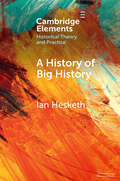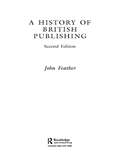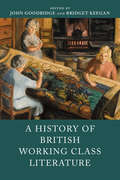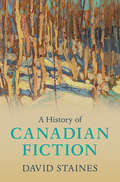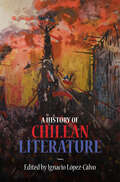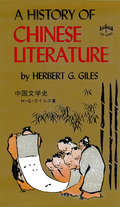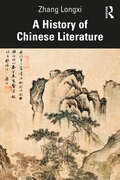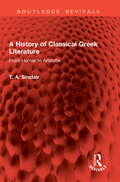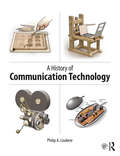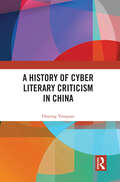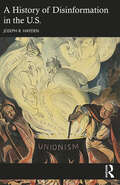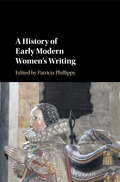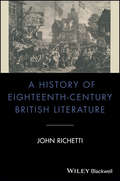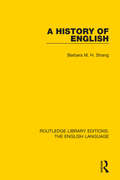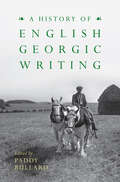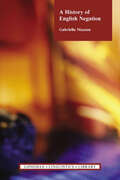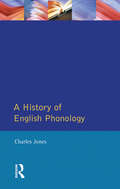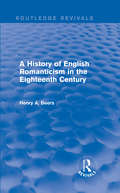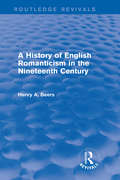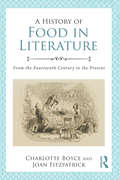- Table View
- List View
A History of Big History (Elements in Historical Theory and Practice)
by Ian HeskethBig History is a seemingly novel approach that seeks to situate human history within a grand cosmic story of life. It claims to do so by uniting the historical sciences in order to construct a linear and accurate timeline of 'threshold moments' beginning with the Big Bang and ending with the present and future development of humanity itself. As well as examining the theory and practice of Big History, this Element considers Big History alongside previous largescale attempts to unite human and natural history, and includes comparative discussions of the practices of chronology, universal history, and the evolutionary epic.
A History of British Publishing
by John FeatherThoroughly revised, restructured and updated, A History of British Publishing covers six centuries of publishing in Britain from before the invention of the printing press, to the electronic era of today. John Feather places Britain and her industries in an international marketplace and examines just how ‘British’, British publishing really is. Considering not only the publishing industry itself, but also the areas affecting, and affected by it, Feather traces the history of publishing books in Britain and examines: education politics technology law religion custom class finance, production and distribution the onslaught of global corporations. Specifically designed for publishing and book history courses, this is the only book to give an overall history of British publishing, and will be an invaluable resource for all students of this fascinating subject.
A History of British Working Class Literature
by John Goodridge Bridget KeeganA History of British Working-Class Literature examines the rich contributions of working-class writers in Great Britain from 1700 to the present. Since the early eighteenth century the phenomenon of working-class writing has been recognised, but almost invariably co-opted in some ultimately distorting manner, whether as examples of 'natural genius'; a Victorian self-improvement ethic; or as an aspect of the heroic workers of nineteenth- and twentieth-century radical culture. The present work contrastingly applies a wide variety of interpretive approaches to this literature. Essays on more familiar topics, such as the 'agrarian idyll' of John Clare, are mixed with entirely new areas in the field like working-class women's 'life-narratives'. This authoritative and comprehensive History explores a wide range of genres such as travel writing, the verse-epistle, the elegy and novels, while covering aspects of Welsh, Scottish, Ulster/Irish culture and transatlantic perspectives.
A History of California Literature
by Blake AllmendingerBlake Allmendinger's A History of California Literature surveys the paradoxical image of the Golden State as a site of dreams and disenchantment, formidable beginnings and ruinous ends. This history encompasses the prismatic nature of California by exploring a variety of historical periods, literary genres, and cultural movements affecting the state's development, from the colonial era to the twenty-first century. Written by a host of leading historians and literary critics, this book offers readers insight into the tensions and contradictions that have shaped the literary landscape of California and also American literature generally.
A History of Canadian Fiction
by David StainesA History of Canadian Fiction is the first one-volume history to chart its development from earliest times to the present day. Recounting the struggles and the glories of this burgeoning area of investigation, it explains Canada's literary growth alongside its remarkable history. Highlighting the people who have shaped and are shaping Canadian literary culture, the book examines such major figures as Mavis Gallant, Mordecai Richler, Alice Munro, Margaret Atwood, Michael Ondaatje, and Thomas King, concluding with young authors of today whose major successes reflect their indebtedness to their Canadian forbearers.
A History of Chilean Literature
by Ignacio López-CalvoThis book covers the full range and diversity of Chilean literature from the times of the Spanish conquest to the present. By emphasizing transnational, hemispheric, and global approaches to Chilean literature, it reflects the relevance of themes such as neoliberalism, migration and exile, as well as subfields like ethnic studies, and gender and sexuality studies. It showcases the diversity of Chilean literature throughout all periods, regions, ethnocultural groups and social classes, all the while foregrounding its regional variations. Unlike previous literary histories, it maps a rich heterogeneity by including works by Chileans of indigenous, African, Jewish, Arab, Asian, and Croatian ancestries, as well as studies of literature by LGTBQ authors and Chilean Americans. Ambitious and authoritative, this book is essential reading for scholars of Chilean Literature, Latin American Literature, the Global South, and World Literature.
A History of Chinese Literature
by Herbert G. GilesA History of Chinese Literature is THE classic introduction to Chinese literature, which has given to the world exquisite poetry and such classics as Monkey, The Analects of Confucius, the works of Chuang Tzu, and other writings over a time span of 2,500 or more years.<P><P>Author, Professor Giles, a legendary scholar of Chinese, was best known for the Wade-Giles romanization system. In this book he considered all forms of Chinese literature including: prose, poetry, the novel, the short story, drama, and scientific writing. The material is organized chronologically into eight books which are in turn divided into subject chapters. The arrival of Buddhism to China, the invention of printing, and other significant events are admirably outlined. Whoever reads this excellent introduction will be hungry for more of the literary products of China.A History of Chinese Literature provides us with a capsule guide to 2,500 years of Chinese culture. Remote as ancient literature may seem to Chinese manners today, the traditional literature does in fact provide a key to modern China and to Chinese communism. This populous nation, which represents the world's oldest living civilization, is in reality still close to its own past philosophies and ideals.
A History of Chinese Literature
by Zhang LongxiZhang Longxi, an internationally renowned scholar of Chinese and comparative literature, is your guide to the three-millennia-long history of Chinese literature from the remote antiquity of oracle bones to contemporary works. Professor Zhang charts the development of the major literary forms in Chinese, including poetry, prose, song lyrics, and plays, and introduces the most famous poets and writers and their representative texts. Taking a period-based approach through the major dynasties, he places these forms, texts, and authors within their historical contexts and tells the fascinating story of Chinese literature with copious examples in English translation. He writes in a clear and accessible style and assumes no prior knowledge of Chinese history or Chinese literature. This book is an ideal introduction for students and the general readers who want to get a broad but thorough overview of Chinese literature in all its richness and diversity.
A History of Chinese Literature
by Zhang LongxiZhang Longxi, an internationally renowned scholar of Chinese and comparative literature, is your guide to the three-millennia-long history of Chinese literature from the remote antiquity of oracle bones to contemporary works. Professor Zhang charts the development of the major literary forms in Chinese, including poetry, prose, song lyrics, and plays, and introduces the most famous poets and writers and their representative texts. Taking a period-based approach through the major dynasties, he places these forms, texts, and authors within their historical contexts and tells the fascinating story of Chinese literature with copious examples in English translation. He writes in a clear and accessible style and assumes no prior knowledge of Chinese history or Chinese literature. This book is an ideal introduction for students and the general readers who want to get a broad but thorough overview of Chinese literature in all its richness and diversity.
A History of Classical Greek Literature: From Homer to Aristotle (Routledge Revivals)
by T. A. SinclairFirst Published in 1934, this book gives a general survey of the history of classical Greek literature from Homer to Aristotle. It discusses important themes like Homeric criticism and the Homeric question; elegiac poetry; lyric poetry; myth and history in verse; Heraclitus and philosophy in prose; the scientific study of history; origins of tragedy; origins of comedy; changes in the fourth century; and Aristotle and the end of the classical period. This is a must read for students of Greek literature and history of classical literature.
A History of Colombian Literature
by Raymond Leslie WilliamsIn recent decades, the international recognition of Nobel Laureate Gabriel García Márquez has placed Colombian writing on the global literary map. A History of Colombian Literature explores the genealogy of Colombian poetry and prose from the colonial period to the present day. Beginning with a comprehensive introduction that charts the development of a national literary tradition, this History includes extensive essays that illuminate the cultural and political intricacies of Colombian literature. Organized thematically, these essays survey the multilayered verse and fiction of such diverse writers as José Eustacio Rivera, Tomás Carrasquilla, Alvaro Mutis, and Darío Jaramillo Agudelo. Written by a host of leading scholars, this History also devotes special attention to the lasting significance of colonialism and multiculturalism in Colombian literature. This book is of pivotal importance to the development of Colombian writing and will serve as an invaluable reference for specialists and students alike.
A History of Communication Technology
by Philip LoubereThis book is a comprehensive illustrated account of the technologies and inventions in mass communication that have accelerated the advancement of human culture and society. A History of Communication Technology covers a timeline in the history of mass communication that begins with human prehistory and extends all the way to the current digital age. Using rich, full-color graphics and diagrams, the book details the workings of various mass communication inventions, from paper-making, printing presses, photography, radio, TV, film, and video, to computers, digital devices, and the Internet. Readers are given insightful narratives on the social impact of these technologies, brief historical accounts of the inventors, and sidebars on the related technologies that enabled these inventions. This book is ideal for students in introductory mass communication, visual communication, and history of media courses, offering a highly approachable, graphic-oriented approach to the history of communication technologies.
A History of Communications
by Marshall T. PoeA History of Communications advances a new theory of media that explains the origins and impact of different forms of communication – speech, writing, print, electronic devices and the Internet – on human history in the long term. New media are 'pulled' into widespread use by broad historical trends and these media, once in widespread use, 'push' social institutions and beliefs in predictable directions. This view allows us to see for the first time what is truly new about the Internet, what is not, and where it is taking us.
A History of Cyber Literary Criticism in China
by Ouyang YouquanThis is the first scholarly attempt to write a history of cyber literary criticism in China. The author uses the Internet as the departure point, literature as the horizontal axis, and criticism as the vertical axis, to draw a detailed trajectory of the development of cyber literary criticism in China.The book comprises two parts. The first part focuses on the representation of historical facts about cyber literary criticism, covering five topics: the evolution of cyber literary criticism in the context of the new media; major types of cyber literary critics and their criticism; academic achievements in cyber literary studies; the form, contents, and rhetorical expressions of so-called netizens’ critical commentaries; and important events in the history of cyber literary criticism. The second part discusses the historical changes in literary criticism as responses to cyber literature, covering another five topics: the conceptual transformation in literary criticism of the Internet era; the establishment of evaluation criteria for cyber literature; changes in the function of cyber literary criticism; changes in the constitution of cyber literary critics; and the impact of cyber literary criticism. This book will be an essential read to students and scholars of East Asian Studies, literary criticism, and those who are interested in cyber literature in general.
A History of Disinformation in the U.S.
by Joseph R. HaydenThis volume recounts notable episodes of distortion throughout American media history. It examines several of the lurid hoaxes and conspiracy theories that have inspired press coverage, as well as some of the political lies promoted by partisan gladiators, whether of the eighteenth century or today.The book moves beyond the sensational stories to show the enduring and systemic nature of media manipulation that occurs on far more consequential issues. It exposes persistent and deeply destructive falsehoods that have been told about women, people of color, immigrants, the LGBTQ+ community, unions, commercial products, highlighting how longstanding “bipartisan” myths have effectively marginalized certain groups of Americans. Alongside these cases, the author carefully dissects the changing nature of institutions, technologies, and practices of journalism in America. Attention is given to the evolution of newspapers in the eighteenth and nineteenth centuries, the role of broadcasting in the twentieth, and the impact of the internet and social media at the dawn of the twenty-first.This book will appeal to readers interested in American history, journalism, communication studies, political science and sociology.
A History of Early Modern Women's Writing
by Patricia PhillippyA History of Early Modern Women's Writing is essential reading for students and scholars working in the field of early modern British literature and history. This collaborative book of twenty-two chapters offers an expansive, multifaceted narrative of British women's literary and textual production in the period stretching from the English Reformation to the Restoration. Chapters work together to trace the contours of a diverse body of early modern women's writing, aligning women's texts with the major literary, political, and cultural currents with which they engage. Contributors examine and take account of developments in critical theory, feminism, and gender studies that have influenced the reception, reading, and interpretation of early modern women's writing. This book explicates and interrogates significant methodological and critical developments in the past four decades, guiding and testing scholarship in this period of intense activity in the recovery, dissemination, and interpretation of women's writing.
A History of Eighteenth-Century British Literature
by John RichettiA History of Eighteenth-Century British Literature is a lively exploration of one of the most diverse and innovative periods in literary history. Capturing the richness and excitement of the era, this book provides extensive coverage of major authors, poets, dramatists, and journalists of the period, such as Dryden, Pope and Swift, while also exploring the works of important writers who have received less attention by modern scholars, such as Matthew Prior and Charles Churchill. Uniquely, the book also discusses noncanonical, working-class writers and demotic works of the era. During the eighteenth-century, Britain experienced vast social, political, economic, and existential changes, greatly influencing the literary world. The major forms of verse, poetry, fiction and non-fiction, experimental works, drama, and political prose from writers such as Montagu, Finch, Johnson, Goldsmith and Cowper, are discussed here in relation to their historical context. A History of Eighteenth-Century British Literature is essential reading for advanced undergraduates and graduate students of English literature. Topics covered include: Verse in the early 18th century, from Pope, Gay, and Swift to Addison, Defoe, Montagu, and Finch Poetry from the mid- to late-century, highlighting the works of Johnson, Gray, Collins, Smart, Goldsmith, and Cowper among others, as well as women and working-class poets Prose Fiction in the early and 18th century, including Behn, Haywood, Defoe, Swift, Richardson, Fielding, and Smollett The novel past mid-century, including experimental works by Johnson, Sterne, Mackenzie, Walpole, Goldsmith, and Burney Non-fiction prose, including political and polemical prose 18th century drama
A History of English (Routledge Library Editions: The English Language #26)
by Barbara M. StrangA History of English, first published in 1970, is a book for beginners in linguistic history. This title examines the changes in English language speech and writing over a period of almost 2000 years, whilst also exploring more recent changes within the author’s living memory. This title aims to raise countless issues for enquiry and discussion, and its purpose is to serve as a springboard for language history learning rather than a textbook.
A History of English Autobiography
by Adam SmythA History of English Autobiography explores the genealogy of autobiographical writing in England from the medieval period to the digital era. Beginning with an extensive introduction that charts important theoretical contributions to the field, this History includes wide-ranging essays that illuminate the legacy of English autobiography. Organized thematically, these essays survey the multilayered writings of such diverse authors as Chaucer, Bunyan, Carlyle, Newman, Wilde and Woolf. Written by a host of leading scholars, this History is the definitive, single-volume collection on English autobiography and will serve as an invaluable reference for specialists and students alike.
A History of English Georgic Writing
by Paddy BullardThe interconnected themes of land and labour were a common recourse for English literary writers between the sixteenth and twentieth centuries, and in the twenty-first they have become pressing again in the work of nature writers, environmentalists, poets, novelists and dramatists. Written by a team of sixteen subject specialists, this volume surveys the literature of rural working lives and landscapes written in English between 1500 and the present day, offering a range of scholarly perspectives on the georgic tradition, with insights from literary criticism, historical scholarship, classics, post-colonial studies, rural studies and ecocriticism. Providing an overview of the current scholarship in georgic literature and criticism, this collection argues that the work of people and animals in farming communities, and the land as it is understood through that work, has provided writers in English with one of their most complex and enduring themes.
A History of English Negation (Longman Linguistics Library)
by Gabriella MazzonNegation is one of the main functions in human communication.A History of English Negation is the first book to analyse English negation over the whole of its documented history, using a wide database and accessible terminology. After an introductory chapter, the book analyses evidence from the whole sample of Old English documents available, and from several Middle English and Renaissance documents, showing that the range of forms used at any single stage is wider, and the pace of their change considerably faster, than previously commonly assumed. The book moves on to review current formalised accounts of the situation in Modern English, tracing the changes in rules for expressing negation that have intervened since the earliest documented history of the language. Since the standard is only one variety of a language, it also surveys the means of negation used in some non-standard and dialectal varieties of English. The book concludes with a look at relatively recently born languages such as Pidgins and Creoles, to investigate the degree of naturalness of the principles that rule the expression of English negation.
A History of English Phonology (Longman Linguistics Library)
by Charles JonesThis is an attempt to view historical phonological change as an ongoing, recurrent process. The author sees like events occurring at all periods, a phenomenon which he considers is disguised by too great a reliance upon certain characteristics of the scholarly tradition. Thus he argues that those innovations arrived at by speakers of the English language many years ago are not in principle unlike those that can be seen to be happening today. Phonological mutations are, on the whole, not to be regarded as unique, novel, once only events. Speakers appear to present to speech sound materials, a limited set of evaluative and decoding perceptions, together with what would seem to be a finite number of innovation producing stratagems in response to their interpretation. It is stressed that this interpretation may itself be a direct product of the kinds of data selected for presentation in traditional handbooks and Jones notes the fact that phonological change is often "messy" and responsive to a highly tuned ability to perceive fine phonetic detail of a type which, by definition, rarely has the opportunity to surface in historical data sources.
A History of English Romanticism in the Eighteenth Century (Routledge Revivals)
by Henry A. BeersFirst published in 1926, this title presents the great artistic and literary innovations of the Romantic movement according to an often overlooked and unacknowledged definition of ‘Romanticism’, which is of particular relevance in the consideration of the English Romantic spirit: pertaining to the style of the Christian and popular literature of the Middle Ages.
A History of English Romanticism in the Nineteenth Century (Routledge Revivals)
by Henry A. BeersA History of English Romanticism in the Nineteenth Century, first published in 1926, presents the great artistic and literary innovations of the Romantic movement according to an often overlooked and unacknowledged definition of ‘Romanticism’, which is of particular relevance in the consideration of the English Romantic spirit: pertaining to the style of the Christian and popular literature of the Middle Ages. The author recapitulates the key contributions of English poets – including Scott, Coleridge and Keats - in light of their recovery of certain themes and leitmotifs that clearly distinguish the Romantic style. In addition, the development of the Romantic movement in France and Germany is given some attention, and the specific tendencies of their respective approaches is considered in relation to England. The emergence of the Pre-Raphaelites is investigated, and a tentative evaluation of the progress of English Romanticism in the nineteenth century is offered.
A History of Food in Literature: From the Fourteenth Century to the Present
by Charlotte Boyce Joan FitzpatrickWhen novels, plays and poems refer to food, they are often doing much more than we might think. Recent critical thinking suggests that depictions of food in literary works can help to explain the complex relationship between the body, subjectivity and social structures. A History of Food in Literature provides a clear and comprehensive overview of significant episodes of food and its consumption in major canonical literary works from the medieval period to the twenty-first century. This volume contextualises these works with reference to pertinent historical and cultural materials such as cookery books, diaries and guides to good health, in order to engage with the critical debate on food and literature and how ideas of food have developed over the centuries. Organised chronologically and examining certain key writers from every period, including Chaucer, Shakespeare, Austen and Dickens, this book's enlightening critical analysis makes it relevant for anyone interested in the study of food and literature.
